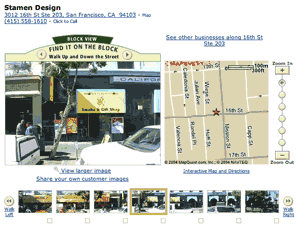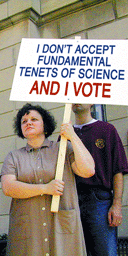tecznotes
Michal Migurski's notebook, listening post, and soapbox. Subscribe to ![]() this blog.
Check out the rest of my site as well.
this blog.
Check out the rest of my site as well.
Jan 28, 2005 7:31am
iron curtain west
How unfortunate, I would've liked to hear Laurent Garnier play, (Ruby Skye notwithstanding). Instead I'll just continue listening a few of his recorded sets. Via Dusko:
LAURENT GARNIER TOUR CANCELLATION STATEMENT
LAURENT GARNIER US TOUR DATES: Fri March 4 SF Ruby Skye CANCELLED, Sat March 5 LA Avalon CANCELLED, Mon March 7 NY Cielo CANCELLED
I am very sorry to have to cancel my forthcoming U.S. tour due to what I consider to be completely unreasonable demands by the U.S. Embassy in France in order to renew my work visa.
In order to obtain this new visa, the rules have once again changed since November 2004 and I would now have to not only fill out an exceedingly probing application form, but also be interviewed by a member of the Embassy staff, and provide proof of ownership of my house, details of my bank account, my mobile phone records, personal information on all my family members and more. I consider these demands to be a complete violation of my privacy and my civil liberties and I refuse to comply.
I am horrified by these new regulations and feel really sad that this is what some call freedom and democracy.
It has now become almost impossible for an artist to come and perform in the United States. And until this new proceedure changes I will unfortunately refuse to comply with this nonsense.
Thank you for your understanding.
Laurent Garnier
Jan 27, 2005 8:13pm
completely floored
I'm in awe:
What kind of company has the time, money, and testicular fortitude to photograph every single block in ten major cities and hook the whole deal up to a yellow pages search? Amazon apparently.
Update, this was probably inevitable:
So, I entered a local pizza joint's name. Search came up with it along with a picture of the store front. I clicked on the "walk up and down the street" arrows to see what else they had. And I keep clicking down the block when I see THE ENTIRE SEPOY HOUSEHOLD on amazon.com!! It must have been sometime in October and we seem to be returning from lunch. Maybe a sunday? How massively weird is that?!
Jan 25, 2005 6:11am
here comes the infocloud
According to Wired (and Slashdot):
In Austin, Texas, a colocation company is building a low-cost data center out of dozens of Mac minis. Underwriters Technologies' Mac mini colocation is housed in Austin's Data Foundry facility, a former bank vault where space is at a premium. Because the Mini measures only 6.5 inches square and is 2 inches high, Underwriters can cram a standard server rack with three times as many minis as full-size servers.
The colocation side of this interests me less than the plain fact that Minis are already being thought of as servers. Thomas Vander Wal has an interesting term, personal information cloud, to describe the bits of data such as phone numbers or to-do lists that seem to belong on cell phones, PDA's, stacks of index cards, and other such pocketable items.
My experience with setting up my Pair account to handle my mail, my website, my del.icio.us-like personal bookmark system, and a bunch of other stuff has led me to think that the best residence for the info cloud may ultimately be on a device such as the Mac Mini, plugged into a home DSL connection rather than colocated in a server room. Most of the needs listed above can be handled elegantly by open source software, and can probably be commoditized enough for Apple to slip them into OS X at some future date as an extension to iLife. The colocated server is pretty abstract, but combine a machine you can see in a place that you know with a .Mac-provided dynamic DNS, and the Mini becomes an ideal storage unit for your networked stuff ("stuff" here is used in the same context, and with the same implied meaning, as Iomega's hugely successful Zip drive ad campaign from, like, forever ago).
Apple has really opened the floodgates for computer contexts that treat the machine as an appliance instead of office equipment. It will be interesting to see all the use possibilities that arise from cheap, small, beautiful machines serving mail, music, movies, pictures or journals.
Jan 25, 2005 2:04am
bitman video bulb
Indescribably cool.
This tiny device plugs directly into an RCA jack, and pumps out a constant stream of "bitman" dancing to any TV, VCR, whatever. I'm in love with the idea of video so compact it can fit in this form factor, and content that is completely static. I can imagine an adaptation of this concept, that contains some sort of environmental sensor (audio, temperature, whatever) and creates environmentally-appropriate graphics with no clunky storage or transmission medium.
Jan 23, 2005 5:22am
on development frameworks
I've been following the chatter about Ruby On Rails for the past few months with some interest: I'm primarily a PHP developer because it's the first language I learned in any serious capacity, and has continued to serve me well for five years running. My ears always prick up when I hear about someone's favorite development environment, so I occasionally buy books on topics like JSP, Python, or even Lisp to keep myself informed on what I've been missing out on, and whether it's time for a switch.
Today, Jason at 37Signals posted a pithy response to Geert Bevin's criticism of RoR, and I feel as though something may have been lost in the shuffle. Geert makes two good points about development frameworks:
It's utterly ridiculous to compare how long it took you to bash a simple application together. ... I think that driving a web application from a database structure is totally backwards.
...which reminds me why I always seem to stick with PHP, no matter how good the books I read sound. RoR's breathless evangelism shows how fast and easy it is to write a web application, but glosses over two reasons that I shy away from frameworks-du-jour:
- Frameworks are often advertised on the basis of their design philosophy, and seem to promise that this will effortlessly translate into elegantly-architected applications. Not so: any framework flexible enough to handle all the potential situations in which it may find itself will also be flexible enough to support terrible design decisions on the part of its users.
- Design is what happens after a framework or environment has been chosen. PHP is often derided as a primitive or childish language, but I've found it flexible enough to support pretty much all the weird stuff I need it to do with a minimum of fuss, which includes building personal frameworks not unlike RoR.
If I were man enough, I guess I'd be a Perl guy.
Jan 19, 2005 6:47am
more freeway interchanges
Via pasta and vinegar, I came across these stunning drawings of nonexistent freeway interchanges today. They tie in neatly with my collection of bay area freeway interchange photographs.
Jan 17, 2005 6:58pm
announcing map_projection, sort of
I've been using a small library of PHP code to do my map projection math for some time, since I started using the Lambert Projection in preference to the much simpler Mercator Projection. The classes I wrote to simplify this process are described in more detail here, and available for free (beer + speech) from PEAR.
They were posted some time ago, but I'm coming to terms with the fact that I'm not going to have the patience to see the PEAR package approval process all the way through, and that a thoroughly-vetted, much-used package still technically in the "proposal" phase is plenty good enough.
Jan 17, 2005 4:29pm
write back
I've added Blosxom's "writeback" plug-in, so it's now possible to leave comments and such here directly (see "responses" link in each post footer). In the past, I've preferred to get mail directly, but interesting conversation seems to be moving to the web in general, so it's about time this site was a little more dynamic.
Jan 13, 2005 7:30am
a little more mappr
Oh and mappr got metafiltered today, which was a nice surprise. Wish they'd have waited two days for the dynamic version.
Jan 13, 2005 7:28am
malcolm gladwell and james surowiecki
Two of my favorite New Yorker writers (the others are Anthony Lane and Adam Gopnik) are currently engaged in a weeklong conversation about their respective books, Blink and The Wisdom Of Crowds. I don't have the attention span to follow this one blow-by-blow, but I plan to pay close attention when they're done.
From worldchanging:
...a public conversation/debate between James "Wisdom of Crowds" Surowiecki and Malcolm "The Tipping Point"/"Blink" Gladwell is still pretty interesting, at least for those of us interested in social networks, framing and memes, group behavior, and cultural change. Surowiecki and Gladwell are two of the best-known social observers around right now, and they both make trenchant observations apt to trigger cascading aha! moments for readers
It's immensely gratifying to have seen the New Yorker explode with vitality and significance since I started subscribing five years ago. When I read my parents' issues as a child, I generally checked only the cartoons, and had a fairly strong view of the magazine as a bit of a wash-up.
I still hate the fiction.
Jan 9, 2005 8:49am
folksonomies and synonyms
Folksonomies are the current hot topic in information organization right now, but Louis Rosenfed points out an important drawback to their use:
Folksonomies are clearly compelling ... but they don't support searching and other types of browsing nearly as well as tags from controlled vocabularies applied by professionals. Folksonomies arent likely to organically arrive at preferred terms for concepts, or even evolve synonymous clusters.
Louis goes on to predict that Flickr, del.icio.us, and other folksonomy-dependent sites (uh, what other folksonomy-dependent sites?) will have difficulty scaling as volume gets out of hand. This is a moot point, volume is already out of hand, and they've scaled fine.
His point about synonyms is a great one, though, and is pointedly ignored in Clay Shirky's rah-rah response. Folksonomies are unlikely to evolve synonyms for the simple reason that people will usually choose just one of the many synonyms available. For example, self portraits on Flickr are usually tagged with me (15,396 photos) or selfportrait (2,150 photos), but who tags their photos with both? Right. So the overlap just isn't there to be able to infer that these two terms are synonymous, just like people tend to use one preferred name for a place with names in many languages, or one preferred name or nickname for a person in particular contexts. We just happen to be in the early stages of a project that hopes to use folksonomies and user-generated meta-data to make sense of free form conversation, so this is going to turn into a bear of a challenge.
(Addendum: there are a few words about this subject on David Smith's site)
Jan 7, 2005 3:19am
bill thompson is wrong
I know it's fashionable to be an iconoclast and all, but this article called "Dump The World Wide Web!" is just silly:
But enough is enough. Just as it is sometimes necessary to demolish old buildings to make way for new, so it is time to move on from the web. It isn't as if we need to look far for an alternative -- we've had one since 1990 when the web was just starting to emerge from CERN physics lab. Its called "distributed processing" and it enables programs to talk to each other in a far richer, more complex and more useful way than the web's standards could ever support.
Yawn.
Here's where I think Bill errs:
- The Web was conceived as a pragmatic approach to a publishing problem. The reason that Berners-Lee's work took off like it did was because it was so basic anyone could understand it and get to work: "When Tim Berners-Lee created the Web he wanted a simple text-based publishing tool for the high-energy physics community, and a simple markup language that let authors specify headings and link to other documents was fine." The World-Wide Web got the cold shoulder from the hypertext community, and it lacked the academic polish that other, more Correct applications had. Nevertheless, as Jason Kottke says, here we are. Any argument founded on the idea that the Web is not good enough because it isn't complete or correct enough is highly suspect, because academic correctness was never the point.
- Bill invokes Microsoft's initial focus on the AOL-like Microsoft Network as evidence that the Web wasn't worthy of attention. Microsoft did not ignore the Web, it tried to ignore the whole Internet, and it did so for economic reasons rather than technical ones. "(Microsoft) never liked the Web and it was only the horrible realisation that every company, every net user and every competitor was going to invest a vast amount of money, effort and resources making it seem like it worked that forced Bill Gates to turn the company around and give it a Web focus late in 1995." That just sounds like the same old M.O. from Microsoft, where new technologies are watched from afar until they prove profitable, then seized wholesale after the difficult pioneering work has been done by others. Fortunately, the Internet isn't a thing, it's an agreement, so it wasn't a market that MS could monopolize.
- Bill contends that such services as news publishing or e-commerce would be better served through the creation of special-purpose protocols and applications, rather than general-purpose browsers, and cites the use of mail clients as evidence that special clients for special content are acceptable. If Bill were writing an article about why we should dump e-mail, I suspect that he would be arguing that advertising mail deserves a special program separate from personal mail. I submit that any new publishing or information service which doesn't use a general-purpose browser faces an uphill battle, and if it doesn't reduce published material into a widely-readable and easily-writeable format like HTML, it had better have a damn good reason for valuing solipsistic correctness over convenience for end-users. RSS is the only example I can think of that might validate Bill's point, and even that is served over HTTP because it's a convenient delivery mechanism.
Anyway, I'll let Stewart Brand have the last word:
Starting anew with a clean slate has been one of the most harmful ideas in history. It treats previous knowledge as an impediment and imagines that only present knowldge deployed in theoretical purity can make real the wondrous new vision. (The Clock of the Long Now, page 74)
Time for a shower, I feel like I've been trolled. Enjoy this refreshing bit of optimism about the Web from Adam Rifkin.
Jan 4, 2005 9:16pm
ahoy, ahoy
Courtesy of Interconnected, excerpt from 1999 NPR interview with Allen Koenigsberg, professor of classics at Brooklyn College:
I think I've actually determined the date and location of the invention of the first `hello' badge, which was in 1880 at Niagara Falls, which was the site of the first telephone operators convention. And I found the minutes of the meeting, and in there he's very proud to see that they're all wearing their name tags. And he says, `We have a new word to go on our name tags, the word "hello."'





